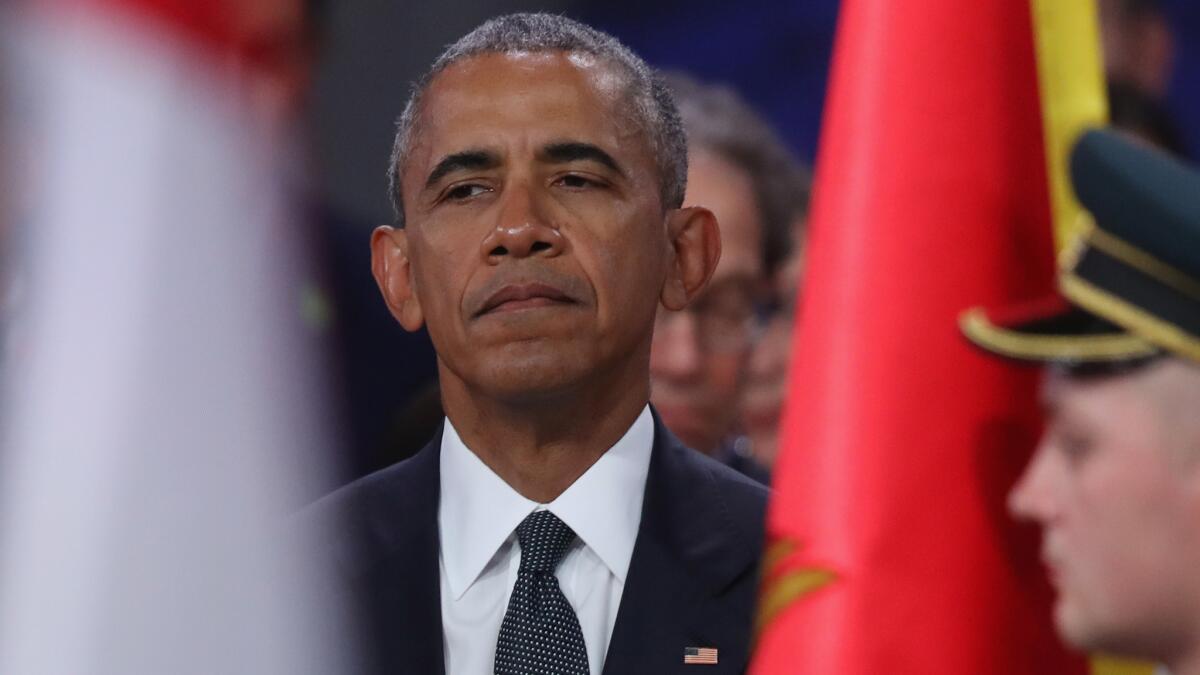The Dallas shooting and the NATO summit combine to test Obama and the reach of presidential influence

- Share via
Reporting from Warsaw — President Obama began the week by wading forcefully into the race to succeed him, warning, “Nobody fully understands the challenges of the job of president until you’ve actually sat at that desk.”
The past 24 hours have offered a case study of the unique and unpredictable trials presidents face. An already-widening gulf between minority communities and law enforcement in the U.S. intruded on Obama’s immediate tasks: confronting instability in Europe and the Middle East at his final NATO meeting.
Aboard Air Force One on Thursday as he traveled to the summit here, Obama grasped new details about police-involved shootings in Louisiana and Minnesota and the protests they had sparked back home. The White House decided he should address the unfolding situation in time to clear his slate Friday for meetings on the uncertain future of the European Union, rocked by Britain’s vote to leave, as well as threats to Western security.
He did, but would return to the same room just nine hours later to mourn new victims: five police officers gunned down in Dallas in a “vicious, calculated and despicable attack on law enforcement.”
The juxtaposition of domestic and global crises — a nation beset by hardened political and racial animosities and a test of the free world’s sense of order — invited debate over whether the American presidency remains, or ever truly was, a singular force capable of summoning solutions.
“We are the most important nation in the world economically, and most powerful militarily,” said James Thurber, a presidential historian at American University. “But that doesn’t always translate into political power internationally, and certainly not domestically.”
To his critics, Obama has too often retreated from moments that require a stronger or more emotional response, or stoked division at times a president needs to be unifying.
Obama’s famously cool approach perhaps is not well-suited to an age in which presidents “don’t have a nanosecond before you have to react,” Thurber said.
Obama often opts for a careful response when talking about heated, racially divisive matters. Little he could say would soothe the angriest listeners.
“Political polarization certainly makes it difficult for people to trust him and makes it difficult for him to bring people together after a tragedy,” Thurber said.
Aides argue the president’s deliberate and calculated approach prevented unforeseen crises from escalating further, that his work to strengthen international alliances has opened diplomatic breakthroughs, and that a recalcitrant Republican-led Congress has stymied political progress.
The White House acknowledged, though, that the massacre in Dallas overshadowed Obama’s meetings with other NATO leaders.
“One of the challenges of the presidency [is that Obama] has to be able to focus on and devote significant attention to more than one priority at a time,” White House Press Secretary Josh Earnest said.
That test played out on two levels over the day. Obama tried to sympathize both with the black victims of police shootings as well as the stricken law enforcement community. And he sought to address the crisis in the U.S. while at the same time prioritizing the uneasiness plaguing Europe over its future.
In his first statement, just after midnight and minutes after landing, Obama offered a data-supported diagnosis of the criminal justice system still wrestling with the uncured “vestiges of that past.” He somberly pointed to potential solutions offered by a task force he had appointed years earlier, while urging Americans again and again to “do better.”
“When people say ‘Black Lives Matter,’ that doesn’t mean blue lives don’t matter; it just means all lives matter,” he said. “But right now the big concern is the fact that the data shows black folks are more vulnerable to these kinds of incidents.”
In his second statement, he defensively called attention to his earlier praise of and respect for the courage of law enforcement and again asked Americans to express “profound gratitude to our men and women in blue — not just today, but every day.”
Obama also stressed what he had come to Poland to do, assess the NATO mission at a crossroads and address the fallout from Britain’s vote to leave the European Union. He rejected what he said was a hyperbolic presumption that Britain’s vote to leave the EU, after he had exhorted voters to stay, would upend the U.S.-European alliance that has been the cornerstone of global security.
Still, he acknowledged the need to “address economic frustrations and anxieties,” and work to “deliver real economic progress in the lives of ordinary people.”
Obama’s engagement in the British vote was without precedent, said Heather Conley, senior director for Europe at the Center for Strategic and International Studies.
“There was a misdiagnosis and lack of attention. And now we’re paying the price for that,” she said. “And in fact, even if we do define a new U.S. role as Europe is rethinking its future, that role may be rejected.”
Still, Obama managed to preserve the strong U.S. role in setting the agenda for NATO, said Rep. Mike Turner (R-Ohio), a member of the House Armed Services Committee. Turner, who addressed the summit Friday in his role as president of NATO’s parliamentary assembly, cited the administration’s identification of Russia as a threat and his view that the White House understands it needs NATO allies’ cooperation to fight Islamic State.
“The president may have been reluctant to lead before,” Turner said. “He is leading now. And the heads of state of NATO are listening to him.”
Twitter: @mikememoli
ALSO
NATO could be at its most critical point since the Soviet Union broke up
Obama condemns ‘despicable’ shootings of Dallas police officers
Use of robot in Dallas highlights tactical opportunities, ethical questions for police
More to Read
Sign up for Essential California
The most important California stories and recommendations in your inbox every morning.
You may occasionally receive promotional content from the Los Angeles Times.











